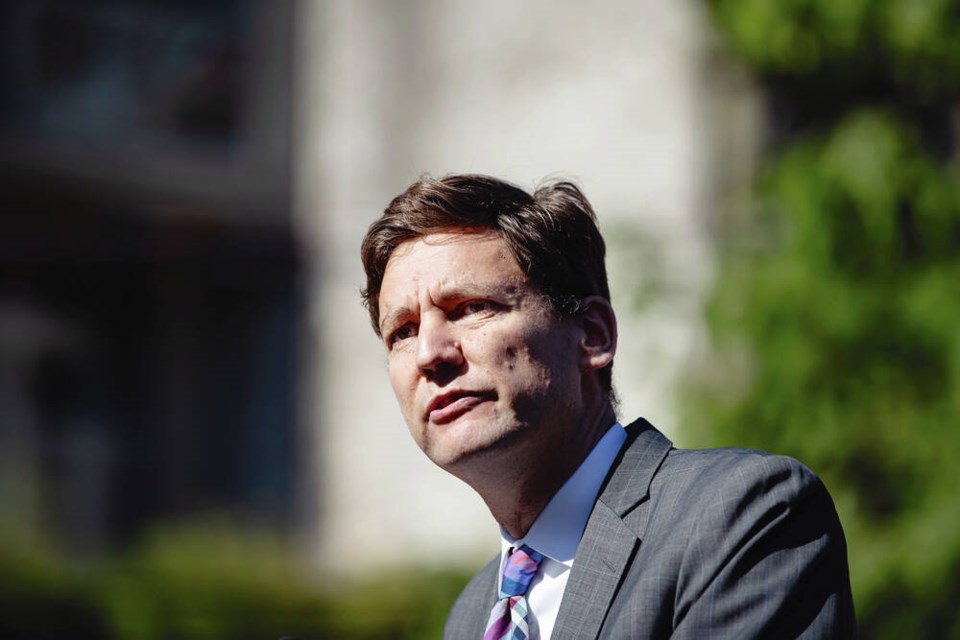NDP leadership candidate David Eby proposed an aggressive suite of measures Wednesday to address the housing shortage, including a $500-million rental-housing acquisition fund for non-profits to buy buildings instead of investors, and a tax on flipping homes.
While his proposals haven’t been costed out or approved, Eby said if he wins the NDP party leadership to become premier, the government will “bring the resources necessary to deliver this plan.”
The plan, which builds on the government’s current 30-part housing proposal, has three major components:
• Using public land to fast-track construction of “affordable, middle-class housing,” with a special focus on Indigenous housing, both on and off reserve. “The opportunity here is for the provincial government to bring together all of the partners, whether it’s non-profit organizations, whether it’s homebuilders, cities, other levels of government, to use public land to build actually attainable housing for the middle class in our province,” Eby said. “This has the potential to deliver thousands of units of actually attainable, affordable housing for families.”
• A rental-housing acquisition fund that allocates $500 million for one-time capital funding in partnership with First Nations, non-profits, and co-ops to buy at-risk affordable rental housing and “discourage speculation by investors.” Eby said rental housing in B.C. and across Canada is increasingly being bought up by huge international corporations, driving up rents for British Columbians.
• An anti-flipping tax to apply to sales of residential properties sold within two years. The tax rate would start high and phase out over two years, and include exemptions for builders and owners with special circumstances such as death, employment loss, divorce or disability. Any revenue would go back into building homes.
The plan also proposes allowing homebuilders in major urban centres to replace a single-family home with up to three units on the same footprint, as long as they are consistent with existing setbacks and height requirements; making secondary suites legal in every region of the province; reforming municipal approvals processes in partnership with municipalities; simplifying provincial permitting for housing; and removing strata restrictions on rentals.
Eby said his housing plan requires co-operation with local governments who want to address housing challenges. “We are going to need all cities to recognize that housing is essential for families, for seniors and people across the province,” he said.
The Union of B.C. Municipalities endorsed the housing plan Wednesday, saying it sets out a “balanced approach that will resonate with many local government leaders.”
The UBCM said provincial investments in capital grants, safeguarding affordable rental housing, a flipping tax, regulating short-term rentals, and improving services for supportive housing are policy changes for which it has advocated.
“Other areas of the plan — such as pre-approving builders to replace a single family home with up to three units — will require close work with local governments in order to be workable and effective but are worth exploring,” said the UBCM.
B.C. Liberal critic Peter Milobar said the plan is heavily based on taxation and rules that already exist, saying he was surprised by the UBCM endorsement, as he’s already heard from mayors unhappy with parts of it.
“If mayors and councillors across the province thought [triple-zoning single-family lots] was a good idea, it would already be in place in their communities,” said Milobar, “so I think there’s going to probably be considerable pushback around local autonomy.”
The B.C. Liberals, he said, want to work with municipalities to help them identify areas for densification that fit the needs of the community, while encouraging more housing units.
But Victoria Mayor Lisa Helps said the “big, bold and necessary moves” Eby laid out to address housing affordability will bring “much-needed relief” to Victorians and others across the province.
Helps, who is not running for re-election next month, said Eby’s plan reflects a spirit of partnership and collaboration with local governments, which are on the front lines of the housing crisis.
Helps rejects the notion Eby is stomping on the autonomy of municipalities.
“My opinion is I see way more carrots than sticks for local government,” said Helps, noting Eby has also proposed increased services for people living in supportive housing, rental supplements for those who need them most, and doubling capital grants to respond to homelessness
“He’s going to give us more money, he’s gonna give us public land to build housing, he’s going to fast track things that we find it difficult to do to build housing, he’s going to give money to non-profits to acquire buildings that are currently being bought up by real estate investment trusts so that we don’t lose affordable housing in our communities, and he’s going to increase funding for non-profit housing so we can get more people off the street,” said Helps.
Eby was NDP housing critic while in opposition and had served as attorney general responsible for housing since 2020, before stepping down this year to run his leadership campaign, after Premier John Horgan announced he planned to step aside this fall. Eby is viewed as the frontrunner in the race against Anjal Appadurai.
The full plan can be found at DavidEby.ca.
>>> To comment on this article, write a letter to the editor: [email protected]



